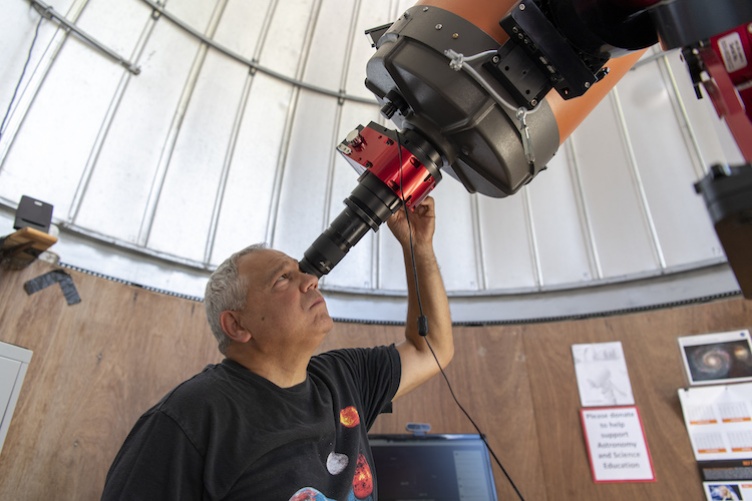
John Gianforte was instrumental in securing a second observatory for UNH, set to open this fall.
A 2017 guest lecture appearance at RiverWoods retirement community in Exeter has resulted in an estate sale purchase of a second observatory for the University of New Hampshire, one that brings new technology to students conducting research and utilizes an optical system long coveted by the UNH Astronomy Committee.
While he credits support from CEPS Dean Cyndee Gruden and Ken La Valley, senior vice provost for outreach and engagement, John Gianforte is the steward of this observatory’s amazing journey from a farm in upstate New York to its new home, planned to be located near UNH’s current observatory.
Gianforte, who holds a joint appointment in Extension and CEPS, UNH mechanical engineer Noah MacAdam, and outgoing and incoming student managers of the UNH observatory, Dom Andreoli and Lance Davis, left Durham early one recent June morning, towing a U-Haul trailer, and spent an entire day disassembling and labelling thousands of parts of the optical system, including the observatory’s dome, and were back in Durham before midnight.
“With everything going on at the university, between its financial constraints and so many people retiring who could have helped, I decided the best thing to do would be to do it ourselves,” Gianforte explains.
  |
| Dom Andreoli, who earned a Ph.D in physics in May; Noah MacAdam, CEPS mechanical engineer; and Lance Davis, grad student in the Space Science Center, disassemble the observatory. (Courtesy photo) |
The telescope, larger than the one UNH currently operates, is a Meade Instrument 16-inch LX600 ACF SCT. A research grade instrument, it will greatly enhance research capability and give students a new tool to capture images through and assist with their research projects. For both CEPS and Extension, it also checks the box to expand outreach efforts. The system is one the UNH Astronomy Committee has been talking about for years and for which Gianforte has written proposals. It is expected to open in the fall.
How It Happened
After Gianforte’s guest lecture at RiverWoods in 2017, he was invited to stay for dinner, and was seated at a table that included two retired physicians with an interest in astronomy. They connected him to staff at the Northern Sky Observatory in Vermont’s Northeast Kingdom – an observatory they had founded, with the help of other like-minded donors.
Gianforte established a strong rapport with the two Vermont observatory managers; he visited their facility and they traveled to the Durham campus to see UNH’s observatory. Then, in April of this year, Gianforte received an email from one of them — a cousin of his had passed away, leaving behind an historic 400-acre farm in Chestertown, New York, several telescopes and … two observatories. The cousin who died after a short battle with cancer was David Starbuck, an anthropologist and archaeologist at Plymouth State University. Starbuck’s mission had always been to bring science to the people – he led numerous archaeological digs throughout the world, and his observatories on the farm were frequently open to the public.
Gianforte was asked if he was interested in any of the instruments. He spoke with both La Valley and Gruden, who quickly gave him the green light, and he purchased $33,000 worth of equipment for less than half the value – a cost that was split between private dollars in CEPS and Extension. The new telescope that will be set up near the current observatory and has the added benefit of a remote control so that one day people can sit inside in front of a huge screen and look at space. “That’s probably way down the road for us, but it’s something we’d definitely like to do,” Gianforte says. “As beautiful as it is, space observation in the winter is very, very cold.”
Starbuck’s family was delighted when they learned one of the observatories was going to a land-grant university with a strong belief in outreach and engagement. “We really are keeping David Starbuck’s legacy alive,” says Gianforte.
And what happened to the sixth-generation family farm? Before he passed away, Starbuck talked to his family, and no one was interested in farm life, so he bequeathed it to his oncologist who had been treating him.
-
Written By:
Kim Billings | Communications and Public Affairs | kim.billings@unh.edu | 603-862-1558
















































